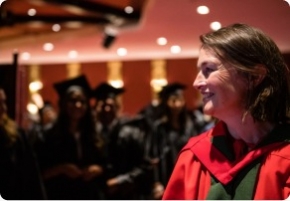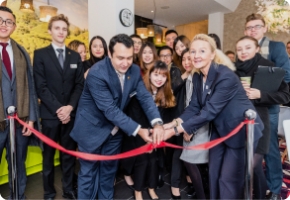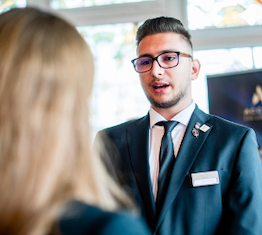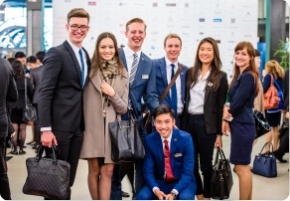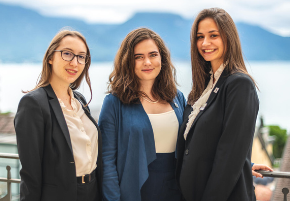- About
- Programs
- Campus Life
- Career Services
- Admissions
- News & Events
- Alumni
Interview with Jonathan Low: HIM alumnus, global conference speaker, master trainer, facilitator, and leadership coach
Interview with Jonathan Low: HIM alumnus, global conference speaker, master trainer, facilitator, and leadership coach
Jonathan Low tailors his conference keynote speaking and leadership coaching work to organizations and senior executives to improve their leadership effectiveness and measurably grow their business results, especially in the areas of sales performance, service quality, leadership communication, and team development. He believes that "increased self-awareness accelerates professional relations and business success".
A Global Speaking Fellow, Certified Speaking Professional (CSP), Master Certified Coach (MCC), and one of Asia's leading Sales, Service, & Leadership Optimizers, as well as an international author, Jonathan has earned numerous well-recognized professional talent development accreditations and certifications in the field of leadership, executive coaching, emotional intelligence, mental toughness, trust-building, resilience, and assessments by reputed international organizations.
Jonathan has more than 25 years of in-depth executive experience in leadership, sales management, customer experience, and business resilience, working with executives and their leadership teams throughout Asia, the Middle East, Africa, Europe, and North America. His never-ending drive to learn and grow in all these areas allows him to successfully deliver his high-energy, engaging, and transformational keynotes to audiences globally.
Described by his clients as inspiring, empowering, and thought-provoking yet caring, Jonathan continues to help leaders explore deeper levels of self-awareness in a safe and trusting environment. This has helped his clients to experience greater intentional growth, inspiring them to new levels of discovery, productivity, and performance. Jonathan guides and coaches them through a plan that also involves valuable inputs and insights from key stakeholders to achieve results for their organizations, teams, and clients themselves.
How did studying in Switzerland affect your life and career?
My time in Switzerland, especially at Hotel Institute Montreux, was not just an educational experience but an opportunity to be exposed to the Swiss culture and their way of life and work.
The rigorous training, diverse community of international students, and exposure to high service standards laid the foundation for my leadership career in the global hospitality sector in the following years. It instilled in me a dedication to quality, service, and discipline that transcends borders, making it a cornerstone of my professional identity and brand.
What inspired you to become a motivational speaker and how do you continue to stay motivated in your own life?
My journey to becoming a motivational speaker was sparked by my desire to make a meaningful impact on and contribution to individuals' professional lives. Besides that, my late mother’s career and life as an educator hugely influenced my decision to embark on this journey as a global conference speaker, master trainer, and leadership success coach for the last 18 years.
As a conference keynote speaker and global leadership coach, my passion lies in boosting leadership effectiveness, fostering growth, and elevating business performance in key areas like sales performance, service quality, leadership communication, and team development. I firmly believe in the mantra, "Increased self-awareness accelerates professional relations and business success.”
This path is sustained by the continued pursuit of knowledge and the satisfaction derived from contributing to others' development and growth. My motivation is rejuvenated each time I get to see, experience, and learn of the positive transformations I contributed in the professional and personal lives of past attendees, delegates, and participants.
How do you customize your motivational messages to resonate with diverse audiences and address their specific needs?
I tend to proactively approach each speaking engagement with a deep respect for the uniqueness of the audience and my client. By researching their cultural, corporate, and individual backgrounds, I am able to craft messages that are not only informative but will resonate with them on a personal level, ensuring that the conference content, insights, and experience are practical, inspiring, and impactful.
Can you share an example of a particularly challenging audience or situation you faced as a speaker and how you turned it into a positive experience?
I do recall instances when some in the audience were initially disengaged or skeptical. By practicing and applying a high level of emotional intelligence (empathy, active listening, inclusion), I involved, engaged, and even co-created the experience by improvising and adapting my message to them. By creating an inclusive environment of openness and positivity, I was able to navigate what could have been a challenging situation.
How do you incorporate storytelling into your motivational speeches, and why do you believe it is an effective communication tool?
Storytelling is indeed a powerful tool that I often incorporate into my speeches and presentations. I believe that through the power of storytelling, complex ideas become relatable; teaching becomes lessons in life through stories and metaphors. Stories have the power to transcend the mundane, making wisdom both accessible and impactful. One such moment was at the TEDxSHMS 2023 in Caux, Switzerland
How do you help individuals and organizations sustain motivation over the long term rather than just providing a temporary boost?
I emphasize to leaders that in order to sustain motivation within their organization, it is important that they create a nurturing environment where continuous growth is not just encouraged, but celebrated. It’s about aligning what's in the heart — the personal values and passions of each individual — with the collective heartbeat of the organization's goals.
Through a leadership coaching culture, I help leaders weave together these individual threads to form a strong tapestry that represents the organization’s culture. This approach ensures that motivation is not just a moment of excitement, but a lasting flame that lights the way for ongoing learning, development, and achievement.
I encourage leaders to celebrate each success, big or small, and to see every challenge as a chance to learn and expand our horizons. This way, motivation isn’t just a temporary surge — it's the enduring energy that drives the organization’s collective success.
How do you stay current with trends and challenges in leadership and motivation, and how does this inform the content of your speeches?
Staying current is critical in my field of work. I am part of various professional communities like Marshall Goldsmith 100Coaches and Thinkers50. I am a member of speakers’ associations within the Global Speakers Federation, International Coaching Federation, Six Seconds EQ Network, Mental Toughness Research Institute, UNITAR International University, Taylor’s University School of Hospitality Tourism and Events, BrandLaureate Foundation, Together We Can Change the World, and many others.
Besides that, I am constantly keeping up with contemporary research from Harvard Business Review, Forbes, Gallup, and The World Economic Forum. I participate in professional forums and constantly curate my knowledge base. This commitment to learning and knowledge ensures that my speeches reflect the latest insights and resonate with current industry challenges and opportunities.
How do you define effective leadership, and what are the key qualities of a successful leader?
Effective leadership in a VUCA (volatile, uncertain, complex, and ambiguous) world can be defined by the ability to navigate through unpredictability with a new form of VUCA (vision, understanding, clarity, and agility).
A successful leader has the foresight to anticipate and mitigate risks, an in-depth understanding of the nuances of various situations, the ability to provide clear communication and direction, and the agility to adapt to rapid change. A leader should also possess resilience to withstand setbacks, emotional intelligence to lead diverse teams, and strategic thinking to make informed decisions.
These qualities will ensure that a leader is not only managing the present but is also prepared for the future, steering the organization through the complexities of a VUCA environment with confidence and competence.
In your experience, what role does emotional intelligence play in effective leadership, and how do you help leaders develop this skill?
Emotional intelligence is the bedrock and foundation of leadership effectiveness. It's about understanding oneself and others, fostering strong relationships, and navigating the complex social landscapes of modern organizations. People with high EQ are more likely to stay calm under pressure, resolve conflict effectively, and respond to co-workers with empathy.
As a member of Six Seconds EQ International community, whose mission is to increase the world’s emotional intelligence, I have over the years been helping organizations and leaders practice emotional intelligence by focusing on the five elements (self-awareness, self-regulation, motivation, empathy, and social skills), as described by Daniel Goleman.
Tell us about your book, “Winning Clients’ Loyalty – Seven Proven Practices to Convert Clients into Amazing Fans“
This is the essence of my book: “Every business wants to convert its clients into amazing fans. Not only will such clients stay with you for the long term, they will also be your organization’s best ambassadors through their enthusiastic word-of-mouth advertising. Ultimately, such fans will help sustain your business, growing it and making it prosper.”
In the book I share the “Seven Proven Practices to Convert Clients into Amazing Fans”, drawn from more than 25 years of experience as working with other professionals in the hospitality industry. These seven practices, embodied in the word S.E.R.V.I.C.E, are applicable to all businesses involving human interaction and engagement. They are a proven strategy on how to win the trust, confidence, and loyalty of the general public and other businesses they deal with.
The book, which reflects my understanding of the nuances of client relations built over many years, is a guide both practical and profound to building customer loyalty.
Discover how HIM can set you on your path to success. Download our brochure to learn about our customizable Bachelor of Business Administration program.
#Alumni

